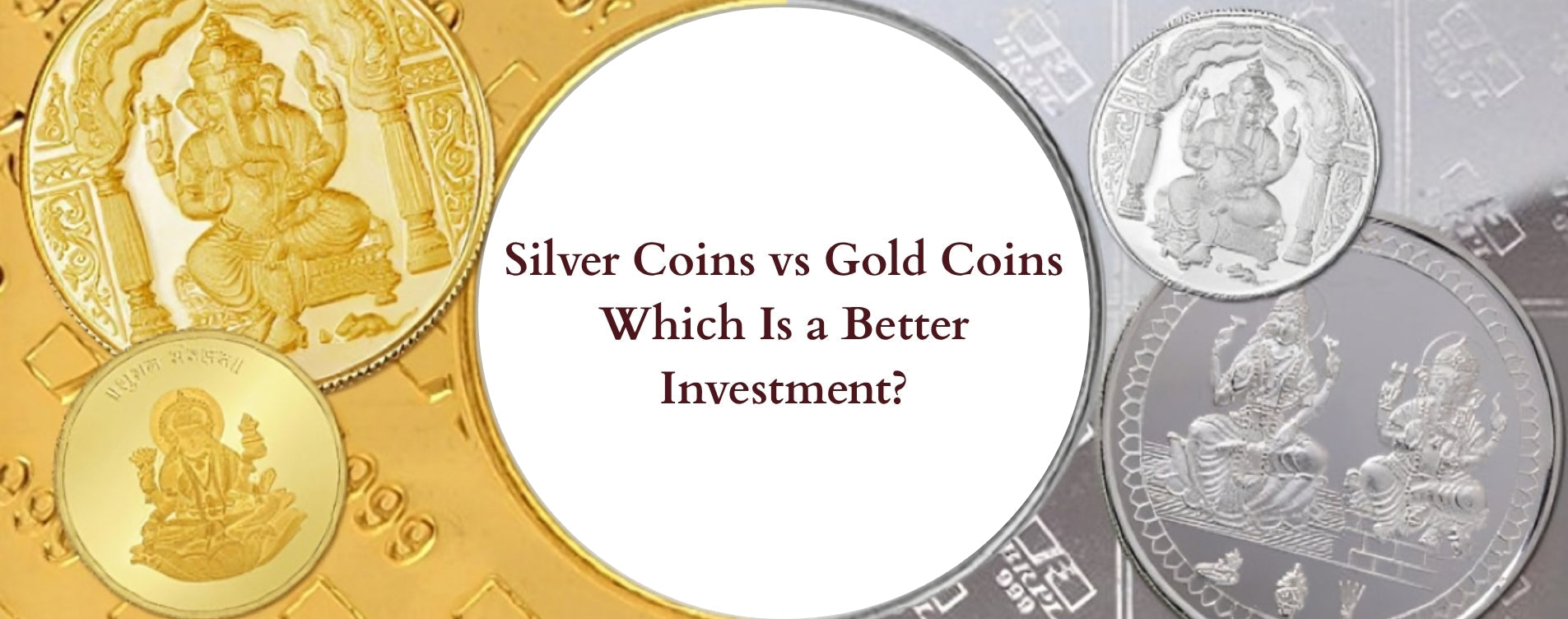
Silver Coins vs Gold Coins — Which is a Better Investment?
When it comes to precious metals, two names always lead the discussion — gold and silver. Both have been trusted for centuries as symbols of wealth, purity, and prosperity. But when it comes to buying coins for investment or gifting, many people ask the same question: which is a better choice—silver coins or gold coins?
At Silviya, we believe that choosing between the two depends on understanding their unique strengths, market behavior, and suitability for your goals. This guide will help you decide which option fits your needs better.
Why Precious Metal Coins Are Important
Gold and silver have always been valued as real assets with intrinsic worth. Unlike paper currency or company stocks, they do not depend on a government or business performance. Precious metals act as a hedge against inflation and economic instability.
Coins, in particular, offer several advantages. They are portable, easy to store, and come with guaranteed purity from trusted mints. They are also ideal for gifting because they represent both financial value and emotional significance. Whether bought as an investment or as a token of love and luck, gold and silver coins carry timeless appeal.
Silver Coins: Strengths and Considerations
Strengths of Silver Coins
Affordability:
Silver coins are much more affordable than gold coins. This allows new investors or small buyers to enter the precious metals market without large capital. You can buy multiple silver coins for the price of a single gold coin, making silver a practical starting point.
Higher Growth Potential:
Silver prices often move more sharply than gold. Because of its smaller market size and industrial demand, silver can deliver higher percentage gains during market upswings. This makes it appealing to investors who are comfortable with moderate risk for potential reward.
Accessibility:
Silver coins are widely available in smaller denominations, making them easy to buy, sell, or gift. Their affordability also makes them a popular choice for festive occasions and corporate gifting.
Considerations for Silver Coins
Higher Volatility:
Silver prices fluctuate more than gold, which means it can gain quickly but also drop faster. This volatility can be unsettling for conservative investors.
Industrial Dependence:
Unlike gold, which is mostly used for jewelry and investment, silver has strong industrial demand in electronics, medical devices, and solar energy. This connection means its price can be affected by changes in industrial production.
Premiums and Liquidity:
Silver coins often have higher premiums (extra cost above market value) compared to gold coins. Also, because they take up more space and value less per unit, they can be less convenient to store or resell in large quantities.
Gold Coins: Strengths and Considerations
Strengths of Gold Coins
Stable Value:
Gold has a long reputation as a safe-haven asset. During economic uncertainty or inflation, investors tend to move towards gold, which helps it retain or even increase in value.
Global Recognition:
Gold coins from reputed mints are recognized and accepted globally. This makes gold one of the most liquid and trusted assets in the world. Selling or exchanging gold coins is usually easier than silver, regardless of location.
Inflation Hedge:
Gold’s value generally rises when the value of currency falls. This makes it an effective way to preserve purchasing power over time.
Considerations for Gold Coins
Higher Entry Cost:
Gold coins are more expensive, which can limit how much investors can buy within a set budget.
Lower Percentage Growth:
While gold is stable, it tends to show smaller price swings compared to silver. This means its short-term returns are usually lower, though it offers steady value over the long term.
Security and Storage:
Because of their high value, gold coins require secure storage such as lockers or safes. This adds to the overall investment cost.
Silver vs Gold: A Direct Comparison
|
Feature |
Silver Coins |
Gold Coins |
|
Entry Price |
Lower; ideal for small budgets |
Higher; suited for large investments |
|
Price Volatility |
High; more risk and reward |
Low; stable and predictable |
|
Industrial Demand |
Strong; used in technology and industry |
Minimal; primarily investment and jewelle ry |
|
Safe-Haven Value |
Moderate |
Strong |
|
Liquidity |
Good, but depends on market |
Excellent and globally accepted |
|
Storage Needs |
More space needed |
Less space, but higher security |
|
Best For |
Entry-level investors, gift buyers |
Long-term investors, wealth preservation |
Which One Should You Choose?
The decision between silver and gold coins depends on your investment goals and personal preferences.
If you are new to investing, have a smaller budget, or want to combine tradition with value, silver coins are a great option. They offer growth potential, affordability, and gifting flexibility.
If your focus is long-term stability, wealth protection, and global liquidity, gold coins are the better choice. Gold helps preserve purchasing power and is less affected by short-term market movements.
Many experienced investors choose a balanced approach. They invest in both metals — silver for its growth and accessibility, and gold for its strength and stability. A mix of both helps balance risk and return over time.
Why Silver Coins Are Gaining Popularity
In recent years, silver has gained attention due to its industrial use and supply constraints. With increasing demand in technology and renewable energy sectors, silver’s long-term potential looks promising. Some reports have shown that silver has even outperformed gold in certain periods. However, silver’s industrial connection also makes it more sensitive to economic changes, so it is best suited for investors who can handle short-term fluctuations.
At the same time, silver coins have cultural and gifting appeal, especially in India. They are used in festivals, weddings, and corporate gifts, adding emotional and traditional value along with financial worth.
What to Check Before Buying Coins
Purity and Source:
Always buy coins from a trusted mint or brand like Silviya, where purity and authenticity are guaranteed.
Premiums:
Compare the premiums you pay over the spot price. Silver often has a higher premium percentage than gold.
Resale Market:
Understand how easily your chosen coin can be sold in your area. Some designs or brands have better resale demand.
Storage:
Both gold and silver require safe storage. For silver, consider the volume; for gold, ensure strong security.
Purpose of Purchase:
If you are buying for gifting, design and presentation matter. For pure investment, focus on purity and liquidity.
Tax and Regulations:
Check local tax laws, as gold and silver may have different import duties or capital gain treatments.
For Gifting and Everyday Buyers
Silver coins have a unique advantage when it comes to gifting. They are elegant, affordable, and come in beautifully crafted designs. Whether for festivals, weddings, or corporate occasions, silver coins carry emotional value and cultural meaning.
At Silviya, we see silver coins as more than just an investment. They represent thoughtfulness, prosperity, and timeless charm. Gold coins, while ideal for high-value gifts, are often reserved for larger celebrations or wealth transfer. Silver coins, on the other hand, make meaningful and practical gifts for every occasion.
FAQ (Frequently Asked Questions)
Q1. Which is better for gifting – silver or gold coins?
Silver coins are usually preferred for gifting because they are affordable, elegant, and available in smaller denominations. Gold coins are more suitable for premium or investment-oriented gifts.
Q2. Which offers better protection against inflation?
Gold is considered a stronger hedge against inflation because it maintains its value during economic downturns. Silver can help too, but its price can fluctuate more due to industrial demand.
Q3. Can I invest in both silver and gold coins?
Yes. Many investors hold both. Silver offers higher potential returns, while gold provides stability. A combination of both helps balance your investment portfolio.
Q4. Are silver coins easy to sell?
Silver coins are easy to sell in most markets, but resale value depends on purity, brand, and market demand. Gold coins are generally more liquid globally.
Q5. Is silver riskier than gold?
Yes, slightly. Silver prices are influenced by industrial usage, making them more volatile. However, this also gives silver higher growth potential.
Conclusion
Both silver and gold coins have their own strengths and roles in an investor’s portfolio. Silver coins are affordable, accessible, and ideal for gifting or starting small. Gold coins, on the other hand, provide long-term stability and global recognition.
If you are looking for something elegant, meaningful, and valuable, silver coins make an excellent choice. If you want a secure, time-tested investment, gold remains unmatched. Many investors prefer to hold both to enjoy the benefits of each metal.
At Silviya, we believe that the best investment is the one that suits your goals and brings confidence to your choices. Whether you choose silver or gold coins, make your decision wisely and let your investment reflect both value and tradition.



